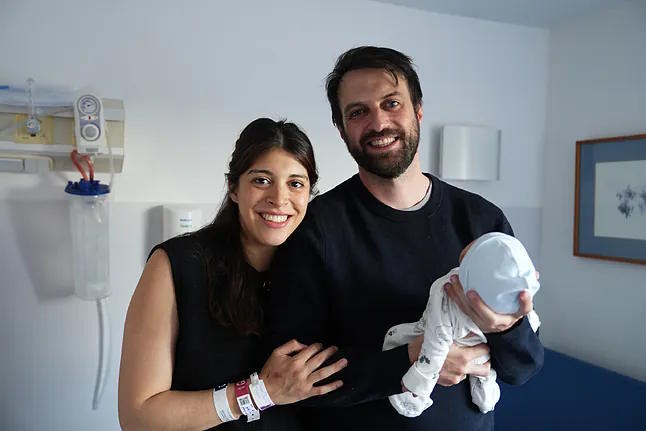Blanca Paredes, obstetric gynecologist, hesitates to call it a miracle. Partly out of modesty, as if she wanted to downplay one of the most exciting deliveries of her career, and partly because, fundamentally, since the dawn of Humanity, women have given birth in the most adverse conditions. "Bright lights are not necessary for giving birth," explains this doctor from Vithas Aravaca University Hospital. It is true that the major blackout on Monday, with the string of incidents we have been recounting like listing the Visigoth kings, immediately focused attention on hospitals, where generators prevented any dangerous situations. However, as the hours passed and the uncertainty grew, at Vithas Aravaca, like in many other centers, non-essential devices and lighting began to be turned off.
And this is where Alejandra's delivery comes into play, a mother who, after arriving at the clinic in the morning, "her water broke before the lights went out", explains Paredes. She was admitted to the Emergency Room "with two centimeters of dilation, and when we started the labor, the blackout occurred". The following hours proceeded normally thanks to the generators, also known as emergency power units, "because we thought the power would be restored soon." But, as will be recorded in hundreds of chronicles that will go down in history, it was not the case.
"While my husband Francesco and my family were on their way, suddenly I lost coverage," explains the mother. "When he arrived, he told me, 'This is collapsing'."
At six in the evening, when the delivery was imminent and after the epidural, the patient was in the operating room with the lights off, as there are translucent windows through which natural light enters. "Since we didn't know how long the blackout would last, we wanted to reserve the light for any possible emergencies that might occur."
And so, Paredes explains, "in the nursing control room, where midwives and gynecologists monitor everything, it was decided to keep the lights to a minimum and we were in semi-darkness." With the dim light coming from the chaotic outside in the late afternoon, a complication-free delivery took place without the need for artificial light, except for the last moment when a spotlight was turned on to check the mother's condition. For example, in case any stitches were needed.
On the left, Dr. Paredes; next to her, gynecologist Trimiño; crouching, Inés, from the midwifery team.E. M.
And this miracle, which was not so much, as history is full of incredible deliveries, courageous mothers, and doctors willing to go above and beyond, was not a leap into the unknown. Some devices were indeed connected at all times to the emergency power supply: the warming crib, the fetal monitor, monitoring the mother's vital signs... And an operating room ready in case a cesarean section was necessary, for example.
"The mother never realized what was happening outside, as she was in a room with light, even if it was natural light," explains Paredes. "We wanted to convey total calmness to her".
"I don't think she was aware of what was really happening, she didn't know what was going on outside," confirms the mother to EL MUNDO from the hospital room, already holding her baby. "In the delivery room, I could see there was light, I don't know if it was from the windows or where, the curtains were opening and closing... so I felt safe and calm at all times."
"He was in and out all the time, but he was very calm, because he knew his wife was well taken care of and the baby was being monitored," the doctor recounts. "He said, 'The important thing is the birth of my son, and whatever happens outside with the blackout, we'll deal with it'."
"There was a lot of willingness from everyone," insists Dr. Paredes. "It wasn't my shift that Monday, but when I saw what was happening throughout the country and that communications were starting to fail, as they couldn't reach me by phone, I went to the hospital to help my colleagues in case any complications arose, as what happened on Monday was something we had never faced before. And although I assisted in the delivery, there were two gynecologists instead of one, in addition to the midwife. Since the pagers to locate us were also not working, the pediatrician was present from the beginning, when normally they would come at the end."
Once Alejandra and Nicolás were transferred to the ward late in the afternoon, perhaps the most emotional moment of the day arrived: informing all the relatives that the delivery had gone smoothly. With the calmness of doctors when discussing health matters as if talking about the price of Brent crude oil, Paredes concludes: "The baby was able to have skin-to-skin contact with his mother, the umbilical cord stopped pulsating, it was a calm, intimate delivery, and despite the chaos outside, the father and mother were able to enjoy the moment as in any other birth."
When communications were restored, Alejandra's Mexican-origin phone started buzzing. "Suddenly all the WhatsApp messages came in, and then... people were asking me how we were doing because many didn't even know that Nicolás had already been born." Alejandra recounts, laughing, that her baby has already been given some nicknames for his impeccable timing in being born on such a day. "But I prefer not to say them," she jokes. "I don't want him to be bullied when he grows up."
The result of this whole adventure with a happy ending? 3.200 kilos of a newborn who came into the world on one of the most remarkable days in recent history. And a fantastic odyssey to tell the grandchildren.
